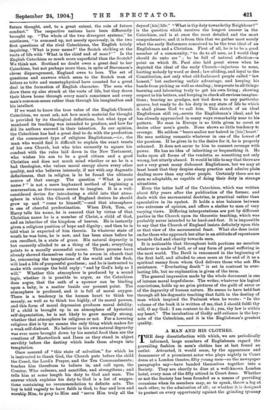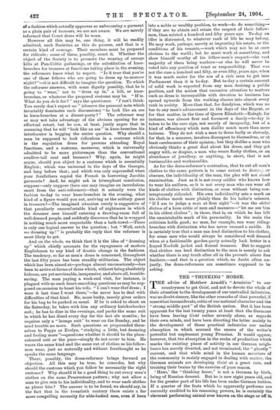T HE deep dissatisfaction with which, we are periodically informed, large
numbers of Englishmen regard the prevailing fashion in men's clothes has at last found an outlet. Attracted, it would seem, by the appearance and demeanour of a prominent actor who plays nightly in Court dress at a London theatre, fifty young men—so the newspaper paragraphs say—have banded themselves together into a Society. They are shortly to dine at a well-known London hotel, every man of the fifty attired in Court dress. Whether or not the Society has been founded as a means of providing occasions when its members may, so to speak, throw a leg at each other, to the admiration of all ; or whether it is designed to protest on every opportunity against the grinding tyranny
of a fashion which actually approves so unbecoming a garment as a plain pair of trousers, we are not aware. We are merely informed that Court dress will be worn.
However all this may be, one thing, it will be readily admitted, such Societies, as this do possess, and that is a certain kind of courage. Their members must be prepared for ridicule ; some of them, possibly, court it. Whether the object of the Society is to promote the wearing of orange kilts at Pan-Celtic gatherings, or the substitution of knee- breeches for trousers at functions taking place in the evening, the reformers know what to expect. "18 it true that you're one of those fellows who are going to dress up to-morrow night?"—it is not difficult to imagine the question. To which the reformer answers, with some dignity possibly, that he is going to "wear," not to "dress up in," a kilt, or knee- breeches, or whatever the proposed costume may be. " H'm. What do you do it for ? " says the questioner. "I can't think. You surely don't expect me" (observe the personal note which invariably dominates such discussions) "to look like an ass in knee-breeches at a dinner-party " The reformer may or may not take advantage of the obvious opening for an effectual retort, but he can, at least, justly argue that in assuming that he will "look like an ass" in knee-breeches his interlocutor is begging the entire question. Why should a man be supposed to look ridiculous in a costume which • is the regulation dress for persons attending Royal functions, and a costume, moreover, which is universally admitted to be more picturesque than the conventional swallow-tail coat and trousers ? Why, again, he might argue, should you object to a costume which is essentially English ; which was universal in the days of the Georges, and long before that ; and which was only superseded when your forefathers copied the French in borrowing Jacobin garments ? And, he might ask in triumphant conclusion, suppose—only suppose (here one may imagine an incredulous snort from the anti-reformer)—that it actually were the fashion to-day to wear knee-breeches in the evening, what kind of a figure would you cut, arriving as the solitary guest in trousers 9—The imagined situation surely is suggestive of that peculiarly uncomfortable kind of nightmare in which the dreamer sees himself entering a drawing-room full of well-dressed people, and suddenly discovers that be is wrapped in nothing much more respectable than a bath-towel.—There is only one logical answer to the question ; but "Well, catch me dressing up ! " is probably the reply that the reformer is most likely to get.
And on the whole, we think that it is the idea of "dressing up" which chiefly accounts for the repugnance of modern Englishmen to any kind of drastic change in the fashions. The tendency, so far as men's dress is concerned, throughout the last fifty years has been steadily utilitarian. The object which has been aimed at—perhaps almost unconsciously—has been to arrive at forms of dress which, without being absolutely hideous, are yet serviceable, inexpensive, and above all, trouble- saving. The man paying a week-end visit, for instance, is plagued with no such heart-searching questions as may be sup- posed on occasion to beset his wife. "I can't wear that dress ; I wore it last time I went there,"—he never has to deal with difficulties of that kind. He, more lucky, merely gives orders for his bag to be packed as usual. If he is asked to shoot on the Saturday, he takes with him any ordinary knickerbocker suit; he has to dine in the evenings, and packs the same suit in which he has dined every day for the last six months ; he requires only a "lounge suit" to wear on the Sunday, and he need trouble no more. Such questions as propounded them- selves to Pepys or Evelyn, "studying a little, but dauncing and fooling more "—questions whether it should be the plum- coloured suit or the puce—simply do not occur to him. He wears the same kind and the same cut of clothes as his fellow- men wear, just as naturally and without forethought as he speaks the same language.
There, possibly, the dress-reformer brings forward an objection. All this may be true, he concedes, but why should the customs which you follow be necessarily the right customs ? Why should it be a good thing to cat every man's clothes on the same Procrustean pattern ; why not allow a man to give rein to his individuality, and to wear such clothes as please him ? The answer is to be found, we should say, in the fact that in the twentieth century there exists a far more compelling necessity for able-bodied men, even if born
into a noble or wealthy position, to work—to do something—. if they are to obtain and retain the respect of their fellow- men, than existed a hundred and fifty years ago. To-day an idler is distrusted, to whatever rank of life he may belong. He may work, perhaps, merely at improving his estate, or the conditions of his tenants,—work which may not be at once obvious to the world; but he must work at something, and show himself worthy of his fellow-men's respect—the vast majority of them being workers—or else he . will never be voted into any position of trust or responsibility. That was not the case a hundred and fifty, or even fifty, years ago, when it was much easier for the son of a rich man to get into Parliament than it is to-day. But to-day a certain amount of solid work is expected from any man desiring a public position, and the notion that excessive attention to matters such as dress is incompatible with devotion to business has spread upwards from the working classes into almost every rank in society. More than that, for dandyism, which was no bar to any man's advancement in the days of the Regent, or for that matter, in the time of Queen Elizabeth—Ralegh, for instance, was almost first and foremost a dandy—to-day is taken to be the sure sign, not merely of incapacity, but of a kind of effeminacy which men dislike much more than mere laziness. They do not wish a man to dress badly or slovenly, for that, in a measure, involves disrespect to themselves, or at least carelessness of their opinion ; but they dislike a man who obviously thinks a great deal about his dress, and they get angry with, or despise, a man who wears flashy clothes, or an abundance of jewellery, or anything, in short, that is not _businesslike and workmanlike.
As for the dress-reformer's contention, that to cut all men's clothes to the same pattern is to some extent to destroy, or obscure, the individuality of the man, the plea will not stand examination. Just as it is not every soldier who knows how to wear his uniform, so it is not every man who can wear all kinds of clothes with distinction, or even without being con- temptuously ridiculed. His own individuality sets a mark on his clothes much more plainly than do his tailor's scissors. "If I am to judge a man at first sight "—it was the °biter dictum of a keen critic of men and manners—" let me see .hitn in his oldest clothes " ; in those, that is, on which he has left the unmistakable mark of his personality. In the main the criticism holds good; no man, for example, can wear riding. breeches with distinction who has never crossed a saddle. It is certainly true that a man can lend distinction to his clothes, for some men who would always be considered well dressed when at a fashionable garden-party actually look better in a frayed Norfolk jacket and flannel trousers. But to suggest that clothes can lend distinction to the man is merely to ask whether there is any truth after all in the proverb about fine feathers,—and that is a question which, no doubt often un- justly, the dress-reformers are sometimes supposed to be asking.
THE " THINKING " HORSE.







































 Previous page
Previous page